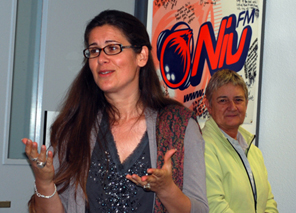
AUCKLAND (Pacific Scoop / Pacific Media Watch): Poor pay is forcing journalists in Papua New Guinea to flee the industry.
That is the message from Dr Evangelia Paputsaki, co-editor of Communication, Culture and Society in Papua New Guinea: Yu Tok Wanem? published last week by Divine Word University Press and Pacific Media Centre.
As former head of communication arts at PNG’s Divine Word University, Dr Papoutsaki watches many young Papua New Guinean journalists struggle to stay in the news industry.
She says Papua New Guinean reporters have “good practice” in reporting but the media is often seen as “overdoing” its role as society’s watchdog.
While journalists fight to change the perceptions of their job, they cannot financially support themselves.
Dr Papoutsaki says the high turnover means journalists don’t get the time to make an impact in the industry.
“The reality is that they have to feed a family,” she says.
Resource exploitation
Dr Papoutaski says media ownership in PNG is also an issue, with journalists at the country’s newspaper The National unable to speak on the “exploitation of resources”. This is due to ownership by the Malaysian logging company Rimbunan Hijau.
“It’s a hard job to be a journalist in Papua New Guinea, you can’t be too judgmental. But they’re doing what they can.”
Now associate professor with Unitec and a research associate with the Pacific Media Centre, Dr Papoutsaki says the book is a collaboration of Australian, NZ and Pacific researchers looking into Papua New Guinea’s media.
She says the book may empower the country’s journalists to read into the media and social concerns of their society, promoting “a better understanding of why things happen the way they do”.
AUT’s foundation professor of Pacific studies, Tagaloatele Peggy Fairbairn-Dunlop, says the book will become a great media resource.
“This book, to me, is going to be one of the seminal works, not only on journalism and communications and changing times for Papua New Guinea, but also for the Pacific.”
Tagaloatele says for Papua New Guinea, the media is an important resource for the people to have, quoting from the book that the country would suffer without it.
“Without effective communication, people in rural areas especially become vulnerable to unscrupulous operators who seek to exploit their natural resources, and even their souls.”

This work is licensed under a Creative Commons Attribution-NonCommercial 3.0 New Zealand Licence.



